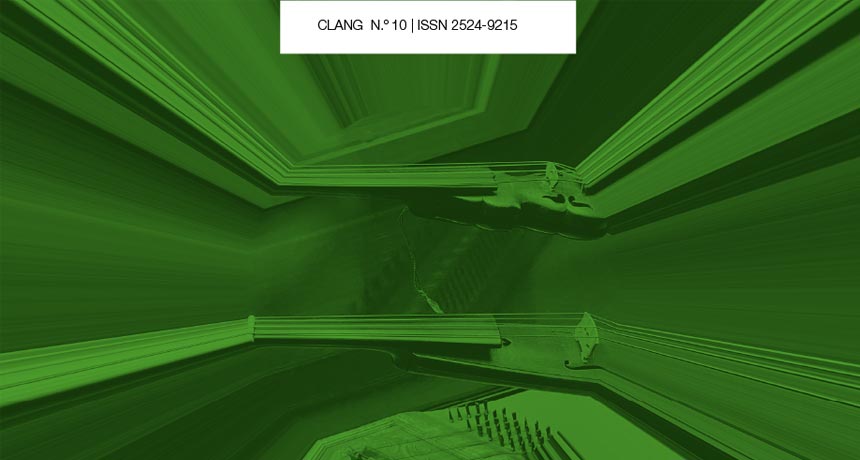Mestizo Transvocality
Characterization of Latin American Collective Songs
DOI:
https://doi.org/10.24215/25249215e051Keywords:
Collective songs, mestizo transvocality, Latin American music, descolonial listen, vocalityAbstract
Based on musical autonomy, research dedicated to Latin American collective songs relegated sound aspects that allow us to recognize common and own principles of musical production. This work includes such manifestations from a mestizo and our American thought that pays attention to the existing correspondences between sound and the historicalstructural conditions in which they have been produced and are being produced. To do this, it proposes mestizo transvocality as a possible methodology to characterize them, understand their specificity and the subversive character they present by questioning, from sound, the discursive rhetoric that sustains and reproduces the coloniality of power and musical knowledge.Downloads
References
Aharonián, C. (2012). Hacer Música en América Latina. Tacuabé.
Aharonián, C. (2007). Músicas Populares del Uruguay. Universidad de la República.
Argumedo, A. (2009). Los silencios y las voces en América Latina. Notas sobre el pensamiento nacional y popular. Colihue.
Barthes, R. (1986). Lo obvio y lo obtuso. Imágenes, gestos, voces. Paidós.
Belinche, D. y Benassi, V. (2016). Cantar: resplandores tardíos de la civilización y la barbarie. Clang, (4), 33-46. https://papelcosido.fba.unlp.edu.ar/ojs/index.php/clang/article/view/84
Belinche, D. (2010). Arte, poética y educación. Facultad de Bellas Artes. Universidad Nacional de La Plata.
di Benedetto, R. (1986). Historia de la música, 8. Editorial Turner
Burke, P. (1991). La cultura popular en la Europa Moderna. Alianza Universidad.
Camacho Díaz, G. (2010). Culturas musicales del México profundo. En A. Recasens Barberà y C. Spencer Espinosa (Coords.), A tres bandas, mestizaje, sincretismo e hibridación en el espacio sonoro iberoamericano (pp. 27-36). Edições Akal.
Carpentier, A. (1984). América Latina en la confluencia de coordenadas históricas y su repercusión en la música. En I. Aretz (Comp.), América Latina en su música (pp. 7-19). Siglo XXI Editores
Davini, S. (2007). Cartografías de la voz en el teatro contemporáneo: el caso de Buenos Aires a fines del siglo XX. Bernal: Universidad Nacional de Quilmes.
Eckmeyer, M. (2018). El que se mete con mi barrio me cae mal. Alternativas analíticas a la estandarización en música popular. Clang (5), e005. DOI: https://doi.org/10.24215/25249215e005
Eckmeyer, M. (2019). La historia de la música como cultura afirmativa. Variaciones musicales sobre Herbert Marcuse. Arte e Investigación (15), e018. http://papelcosido.fba.unlp.edu.ar/ojs/index.php/aei
Escobar, T., Colombres, A. y Acha, J. (2004). Hacia una teoría americana del arte. Del Sol.
Hall, S. ([1990] 2010). Identidad cultural y diáspora. En E. Restrepo, C. Walsh y V. Vich (Editores), Sin garantías. Trayectorias y problemáticas en estudios culturales (pp. 349-362). Envión Editores.
Keil, Ch. (2008). Las discrepancias participatorias y el poder de la música. En F. Cruces y otros (Editores), Las culturas musicales: lecturas de etnomusicología (pp. 261-274). Ed. Trotta.
Lamolle, G.y Lombardo, E. (1998). Sin Disfraz. La murga vista de adentro. Ediciones del Tump.
Laplantine, F. y Nouss A. (2007). Mestizajes. De Arcimboldo a zombi. Buenos Aires: Fondo de
Cultura Económica.
López F., Boris. (110 de septiembre de 2011). Movimiento Cultural Saya Afroboliviano. Si yo fuera presidente. [Archivo de video]. YouTube. https://www.youtube.com/watch?v=lmWSxfMIDDo
Marcuse, H. (1970). Cultura y sociedad. Editorial Sur.
Mignolo, W. (2014). Desobediencia epistémica. Retórica de la modernidad, lógica de la Colonialidad y gramática de la descolonialidad. Del signo.
Quijano, A. (2020). Cuestiones y horizontes: de la dependencia histórico-estructural a la colonialidad/descolonialidad del poder. CLACSO.
Quintero Rivera, Á. (2009). Cuerpo y cultura. Las músicas “mulatas” y la subversión del baile. Iberoamericana.
Rivera Cusicanqui, S. (2018). Un mundo ch'ixi es posible. Ensayos desde un presente en crisis. Tinta Limón.
Segato, R. (2013). La crítica de la colonialidad en ocho ensayos y una antropología por demanda. Prometeo Libros.
Small, Ch. (1999). El Musicar: Un ritual en el Espacio Social. Revista Trans (4). https://www.sibetrans.com/trans/article/252/el-musicar-un-ritual-en-el-espacio-social
Small, Ch. (1991). Música, sociedad, educación. Alianza.
Vilas, P. (2017). Cantos, voces y vocalidades: acervos etnomusicológicos y formación de cantantes. En S. Romé (Ed), I Congreso Internacional de Música Popular: epistemología, didáctica y producción, (pp. 381-392). Universidad Nacional de La Plata. Facultad de Bellas Artes.
Thompson, E. P. (1995). Costumbres en común. Editorial Crítica SL
Weber, W. (2011). La gran transformación en el gusto musical: La programación de conciertos de Haydn a Brahms. Fondo de Cultura Económica.
Downloads
Published
How to Cite
Issue
Section
License

This work is licensed under a Creative Commons Attribution-NonCommercial-ShareAlike 4.0 International License.
The acceptance of the manuscript by the magazine means the non-exclusive cession of the property rights of the authors in favour of the editor, who allows the reuse, after publication (post print), under a license Attribution-NonCommercial-NoDerivatives 4.0 International.
According to these terms, the material can be copied and redistributed by any means or in any format as long as a) the author and original source of the publication are quoted (magazine and URL of the work), access to the license is provided and whether changes have been made is mentioned; and b) the material is not used for commercial purposes.
The cession of non-exclusive rights means that after the publication (post print) in Clang the authors can publish their work in any language, means and format; in such cases it must be mentioned that the material was originally published in this magazine. Such cession also means the authorization of the authors for the work to be collected by SEDICI, the institutional archive of the Universidad Nacional de La Plata, and to be spread in the databases that the editorial team considers appropriate to increase the visibility of the publication and its authors.
Moreover, the magazine encourages the authors to deposit their productions in other institutional and thematic archives under the principle that offering the society the scientific and academic production without any restrictions contributes to a greater exchange of the global knowledge.












 </a >
</a >












